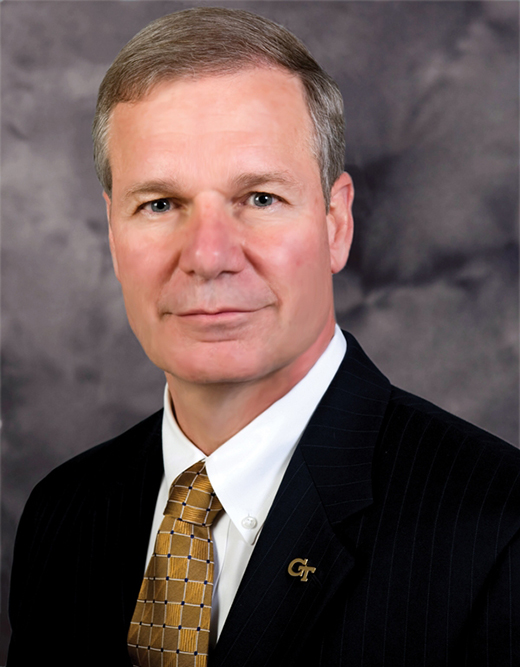Georgia Tech president receiving honorary doctorate from Kansas State University
Monday, April 2, 2018
MANHATTAN — A Kansas State University alumnus who has an active role in helping establish the national research and education agendas will be the recipient of an honorary doctorate from the university.
G.P. "Bud" Peterson, the president of the Georgia Institute of Technology, will receive the honor at commencement for Kansas State University's Graduate School at 1 p.m. Friday, May 11, in Bramlage Coliseum. Peterson also will present the commencement address at the ceremony.
The awarding of the honorary doctorate follows approval by the Kansas Board of Regents and is the highest honor the university can give.
"Since earning his bachelor's degrees in mechanical engineering and mathematics and a master's degree in industrial engineering from K-State, Dr. Peterson has gone on to distinguish himself nationally both as a scientist and as an educator," said April Mason, the university's provost and senior vice president. "His work has earned him appointments by two presidents to serve on national scientific and engineering boards, and he also serves on the executive committee of the Association of American Universities board of directors. We at Kansas State University are very proud of Dr. Peterson."
In 2008 Peterson was appointed by President George W. Bush to the National Science Board, which oversees the National Science Foundation and advises the president and Congress on matters related to science and engineering research and education. In 2014 he was reappointed to the board by President Barack Obama, who also appointed Peterson to the Advanced Manufacturing Partnership 2.0 Steering Committee. In addition, he was appointed to serve on the U.S. Council on Competitiveness and the National Advisory Council on Innovation and Entrepreneurship.
Peterson's national service also extends to intercollegiate athletics. He is chair of the NCAA board of governors and is a member of the Knight Commission on Intercollegiate Athletics.
Peterson's research interests have focused on the fundamental aspects of phase-change heat transfer, including the heat transfer in reduced-gravity environments, boiling from enhanced surfaces, and some of the earliest work on flow and phase-change heat transfer in microchannels. Early investigations focused on applications involving the thermal control of manned and unmanned spacecraft and progressed through applications of phase-change heat transfer in the thermal control of electronic components and devices. More recent work has included fundamental applications of phase-change heat transfer to the field of biotechnology, including the in-situ treatment of cancerous tissue using hypothermia and hyperthermia to arrest epileptic seizures through the rapid cooling of localized brain tissue, which required highly efficient heat-dissipation devices capable of dissipating thermal energy to the surrounding tissue.
Peterson was appointed the 11th president of the Georgia Tech on April 1, 2009, after serving three years as chancellor of the University of Colorado, Boulder. He also served as provost at Rensselaer Polytechnic Institute in New York and on the faculty at Texas A&M University, where he earned his doctorate in mechanical engineering. In his 19 years at Texas A&M, his many leadership positions including head of the mechanical engineering department, executive associate dean of engineering and associate vice chancellor for engineering for the Texas A&M University System.
Before joining Texas A&M, Peterson was a visiting research scientist at NASA's Johnson Space Center in Houston and associate professor and head of the general engineering technology department at Kansas Technical Institute in Salina, now known as Kansas State University Polytechnic Campus. He also taught mathematics, physics and chemistry at Shawnee Mission South High School in Overland Park and Wabaunsee County High School in Alma.
In September 2016, Peterson took part in a Landon Lecture panel that featured Kansas State University alumni who were leaders of higher education institutions.

